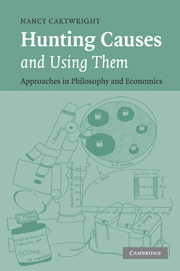Book contents
- Frontmatter
- Contents
- Acknowledgements
- Introduction
- Part I Plurality in causality
- Part II Case studies: Bayes nets and invariance theories
- Part III Causal theories in economics
- 11 Preamble
- 12 Probabilities and experiments
- 13 How to get causes from probabilities: Cartwright on Simon on causation
- 14 The merger of cause and strategy: Hoover on Simon on causation
- 15 The vanity of rigour in economics: theoretical models and Galilean experiments
- 16 Counterfactuals in economics: a commentary
- Bibliography
- Index
14 - The merger of cause and strategy: Hoover on Simon on causation
Published online by Cambridge University Press: 03 December 2009
- Frontmatter
- Contents
- Acknowledgements
- Introduction
- Part I Plurality in causality
- Part II Case studies: Bayes nets and invariance theories
- Part III Causal theories in economics
- 11 Preamble
- 12 Probabilities and experiments
- 13 How to get causes from probabilities: Cartwright on Simon on causation
- 14 The merger of cause and strategy: Hoover on Simon on causation
- 15 The vanity of rigour in economics: theoretical models and Galilean experiments
- 16 Counterfactuals in economics: a commentary
- Bibliography
- Index
Summary
Three theses
When Kevin Hoover analyses the work of Herbert Simon on causation in deterministic systems, Simon turns out to be describing a far different kind of causal relation than when I study Simon. Mine are the more conventional relations to study in the philosophical literature but Hoover's are more readily of use for policy – and hence might reasonably be at the core of concern in economics. Hoover's are also more widely applicable, though we may more often lack the information necessary to establish them. So, I shall argue for three theses here:
Hoover (with macroeconomics in view) studies a different kind of causal relation from ‘usual’ (for instance, different from most of the others described in ch. 2 in this book). He studies strategy relations rather than production relations.
Knowledge of strategy relations is more immediately helpful for setting policy than is knowledge of production relations.
If we demand that production relations be able to deliver exactly the same kind of advice for policy as strategy relations, then production relations will only obtain in a subset of the systems in which strategy relations obtain. They may though be easier to learn about.
I should note that in keeping with my own treatment of Simon, I shall assume throughout that causation is asymmetric – quantities do not mutually cause each other. Hoover objects to this assumption in studying macroeconomic quantities and his arguments have convinced me that he is right.
- Type
- Chapter
- Information
- Hunting Causes and Using ThemApproaches in Philosophy and Economics, pp. 203 - 216Publisher: Cambridge University PressPrint publication year: 2007

